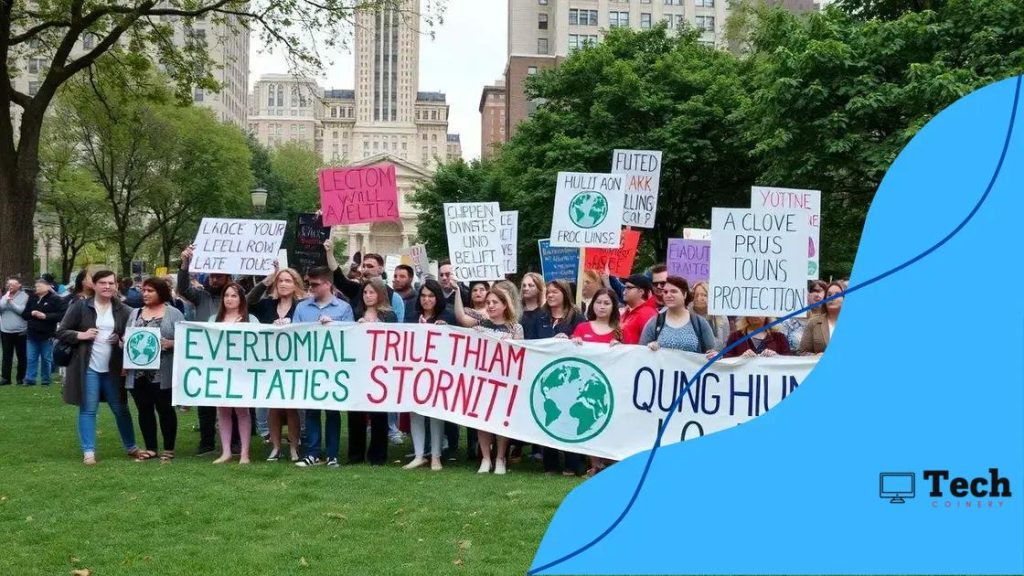Protest over environmental deregulation raises alarm

Protests over environmental deregulation highlight community activism as essential for raising awareness and influencing policies that protect the environment and public health.
Protest over environmental deregulation has taken center stage as communities rally for stronger protections. Have you ever wondered what these actions mean for our planet and future policies?
Understanding the implications of environmental deregulation
Understanding the implications of environmental deregulation is crucial for everyone. As rules around environmental protections change, many communities are affected. Deregulation can lead to greater economic growth, but at what cost to our planet?
The economic impact of deregulation
When environmental rules are rolled back, businesses often see a boost to profits in the short term. This change can attract investment and create jobs. However, the long-term effects can be damaging. It is vital to weigh the quick gains against potential risks.
Health and safety concerns
Removing regulations can increase pollution. Poor air quality and contaminated water sources pose significant risks to public health. This raises questions about the cost of deregulation on community well-being.
- Increased respiratory and cardiovascular diseases.
- Higher rates of waterborne illnesses.
- Greater environmental disasters due to unregulated activities.
The consequences of these health issues can burden healthcare systems and affect productivity. Citizens deserve to know how changes in regulation can impact their lives.
Social and environmental activism
As people become aware of the implications of deregulation, activism rises. Grassroots movements advocate for stronger protections, emphasizing the importance of keeping ecological balance. Protests and awareness campaigns highlight key issues that resonate with many.
Such efforts often lead to local initiatives aimed at improving sustainability. As communities unite, they can challenge deregulation efforts and push for policies that favor long-term environmental health.
In conclusion, understanding the implications of environmental deregulation goes beyond economics. It ties into health, community welfare, and the environment itself. Active participation is necessary to advocate for meaningful change.
Key events leading to recent protests
Key events leading to recent protests have sparked nationwide conversations about environmental issues. Understanding these crucial moments helps to illustrate why activists and communities are rallied against environmental deregulation.
The turning points
Several alarming incidents have put environmental deregulation in the spotlight. Most notably, the oil spill that devastated local ecosystems was a wake-up call for many. As communities witnessed the damage firsthand, anger grew, fueling protests.
Legislative changes
Recent legislative actions have also contributed to escalating tensions. When laws aimed at protecting natural resources are weakened or eliminated, people feel their health and future are at risk. For instance, reductions in emissions standards have sparked outrage, causing citizens to take to the streets.
- Loss of protected wildlife habitats.
- Increased cases of pollution-related health issues.
- Stripping away local community input in decision-making.
Such actions serve as rallying points for environmentalists. They encourage people to mobilize and voice their frustrations against changes they perceive as harmful.
Grassroots movements
Grassroots movements have gained momentum as communities push back against these developments. Social media campaigns highlight key events, raising awareness and organizing protests. Activists share stories of personal impact, fostering a sense of unity among diverse groups with the same mission.
These events have shown that collective action can lead to real change. As more people become informed and involved, the demand for sustainable practices grows. This surge in activism can shape the future direction of environmental policy.
Voices from the ground: experiences of activists

Voices from the ground provide a powerful insight into the experiences of activists fighting against environmental deregulation. Their stories reveal the passion and determination that fuel movements for change. Each story highlights unique perspectives and challenges faced by those on the frontlines.
Personal journeys
Many activists come from diverse backgrounds, all united by a common goal. For instance, some grew up in communities impacted by pollution. Witnessing the effects of environmental neglect inspired them to take action. Others may have encountered environmental issues during their travels, prompting them to advocate for sustainable practices.
Challenges faced
Activists often encounter numerous hurdles in their efforts. They work long hours, balancing jobs, family, and activism. This commitment can lead to exhaustion, but their passion keeps them going. Importantly, they face opposition from powerful entities pushing for deregulation. They often encounter negative media portrayals or pushback from corporations.
- Emotional toll of facing adversity.
- Confronting misinformation and skepticism.
- Building coalitions amid varying viewpoints.
Despite these challenges, activists are resourceful. They utilize social media to share their stories, educate others, and raise awareness. Personal narratives create connections that inspire more people to join the cause.
Building community support
As activists share their experiences, they foster a sense of community. Local events provide a space for people to come together, express their concerns, and support each other. These actions not only empower individuals but also strengthen collective voices.
The engagement of diverse community members is crucial. While some focus on legislative action, others may emphasize education or artistic expression. Each approach plays a role in a larger movement towards sustainability.
The role of social media in mobilizing protests
The role of social media in mobilizing protests has become essential in today’s world. Platforms like Twitter, Facebook, and Instagram allow activists to share information rapidly. This quick communication helps spread awareness about environmental deregulation and related issues.
Instant communication
Social media enables instant sharing of updates and events. Activists can organize protests in real-time, allowing them to respond quickly to changes. For example, when a new deregulation policy is announced, activists can immediately rally support and inform others about the implications.
Building communities
These platforms play a crucial role in building supportive communities. Individuals who may feel isolated in their concerns about the environment can connect with like-minded people. Through online groups and hashtags, they find encouragement to participate in movements.
- Strengthening local and global connections.
- Encouraging dialogue about pressing issues.
- Sharing personal stories that resonate with others.
This sense of belonging motivates people to attend protests, share experiences, and join campaigns. When individuals feel they are part of something bigger, their commitment to activism grows.
Raising awareness
Social media also serves as a powerful tool for raising awareness. Activists utilize eye-catching visuals, hashtags, and engaging stories to capture the public’s attention. Videos and infographics make it easier to understand complex issues related to environmental deregulation.
These creative approaches help educate a wider audience. By mobilizing online support, activists can pressure policymakers to reconsider harmful regulations. The visibility gained through social media can push environmental issues to the forefront of public discourse.
Future prospects for environmental regulations
Future prospects for environmental regulations are crucial as society grapples with the impacts of deregulation. Balancing economic growth with ecological sustainability is a growing concern for policymakers and citizens alike.
Emerging trends
New trends in sustainability focus on cleaner technologies and renewable energy. As awareness of climate change increases, more individuals push for stricter regulations that promote environmental health. Governments are beginning to recognize the long-term benefits of sustainability, leading to potential policy shifts.
Role of technology
Technology plays a vital role in shaping future regulations. Innovations in energy efficiency, waste management, and pollution control are essential. These advancements can help mitigate the harmful effects seen in deregulation scenarios. For instance, smart technologies can monitor emissions in real-time, allowing for immediate corrective actions.
- Increased advocacy for sustainable practices.
- Investment in clean energy initiatives.
- Collaboration between governments and tech companies.
This integration of technology and policy can result in more effective regulations that protect the environment while supporting economic growth. Citizens have a role, too, as their preferences for eco-friendly products can influence market trends.
Community involvement
Community involvement is crucial as well. Citizens must engage in discussions about their environment and advocate for policies that reflect their values. By participating in local meetings, sharing concerns, and supporting green initiatives, they can push for meaningful change.
Grassroots movements continue to gain momentum, urging local and national governments to prioritize environmental protection. As more people express their concerns, the prospects for future regulations can shift toward a more sustainable direction.
FAQ – Questions About Environmental Deregulation and Activism
What is environmental deregulation?
Environmental deregulation refers to the process of reducing or eliminating rules and regulations designed to protect the environment.
How can social media help in environmental activism?
Social media enables activists to share information quickly, mobilize support, and raise awareness about environmental issues.
What role do activists play in shaping environmental policies?
Activists advocate for stronger protections, educate the public, and pressure policymakers to reconsider harmful regulations.
Why is community involvement important in environmental issues?
Community involvement fosters engagement, empowers citizens to voice their concerns, and helps push for meaningful change in regulations.






